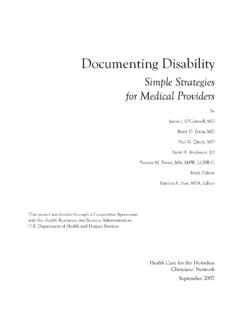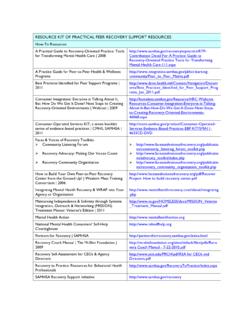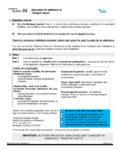Transcription of The use of the MoCA as a Brief Screen for Cognitive ...
1 Jonathan Feinberg, Ciara Mahan, Kohl, CoordinatorThe use of the MoCA as a Brief Screen for Cognitive impairment ( montreal Cognitive assessment ) describe Santa Clara County Homeless facts and the Medical Respite what Cognitive assessments are, focusing on the MoCAand MoCAadministration and why it is important to give Cognitive assessments when seeing the homeless population 2013 Santa Clara Valley Health & Hospital SystemBetter Health for All2 HOMELESS FACTS 2013 Santa Clara Valley Health & Hospital SystemBetter Health for All3 There are 7631 homeless individuals in Santa Clara County. Santa Clara County has the 5thlargest homeless population in the United StatesTop Four: LA NYC San Diego Las Vegas2013 Santa Clara County Homeless CensusHOMELESS FACTSG ender Breakdown Single Men -67% Single Women-31% Transgender-2%Age Breakdown Children -9% Youth -14% Adult -77%2013 Santa Clara Homeless Census 2013 Santa Clara Valley Health & Hospital SystemBetter Health for All4 HOMELESS FACTS 2013 Santa Clara Valley Health & Hospital SystemBetter Health for All5 Race breakdown Caucasian 28% African American 22% Hispanic 31% Multi-Ethnic 19%2013 Santa Clara County Homeless CensusHOMELESS FACTSSLEEPING 26% sleep sheltered emergency shelters -12% transitional housing -13% 74% sleep unsheltered Street -31% Abandoned buildings -9% Cars -16% Encampments -19%2013 Santa Clara County Homeless Census 2013 Santa Clara Valley Health & Hospital SystemBetter Health for All6 HOMELESS FACTSPRIMARY EVENT THAT LED TO HOMELESSNESS Lost
2 Job-17% Evicted or landlord stopped renting-12% Argument or asked to leave-9% Incarceration-8%2013 Santa Clara County Homeless Census 2013 Santa Clara Valley Health & Hospital SystemBetter Health for All7 HOMELESS FACTSH ealth Status51% have 2 or more disabling conditions: Physical Disabilities Chronic substance abuse Chronic Mental Illness 2013 Santa Clara County Homeless Census 2013 Santa Clara Valley Health & Hospital SystemBetter Health for All8 BREAKDOWN OF CHRONIC HEALTH ISSUES 2013 Santa Clara Valley Health & Hospital SystemBetter Health for All9 HIV/ TB/ Hep C/STD s Uncontrolled Hypertension Uncontrolled Diabetes Poor Dental Health Tobacco Dependency Mental Health Disorders Drug and Alcohol DependencyWHO IS VALLEY HOMELESS HEALTHCAREPROGRAM? 2013 Santa Clara Valley Health & Hospital SystemBetter Health for All10We are a patient centered, integrated healthcare teamconsisting of: Medical Providers Nurses Medical Assistants Medical Social Workers Psychologists Psychiatrists Health service representatives Outreach workers Outreach driversMEET BRUCE WILLIS A MEDICAL RESPITE CLIENT 2013 Santa Clara Valley Health & Hospital SystemBetter Health for All11 Bruce is a 55 year old male admitted to the Medical Respite after he fell and broke his leg.
3 Born to a large Hispanic migrant worker family Experienced a traumatic episode Spent the next 27 years in a locked facility for the criminally insane Chronic alcoholic worked at a liquor store Homeless for the last 20 yearsMEDICAL RESPITE PROGRAM (MRP) 2013 Santa Clara Valley Health & Hospital SystemBetter Health for All12 A place for homeless folks to heal after they have been in the hospital. MRP coordinates the medical, social and mental health services in hopes of breaking the cycle of homelessness. Takes referrals from 9 Santa Clara County Hospitals Integrated staff 15 bed unit located in the counties largest homeless shelter-We are expanding to 20 beds! A client stays for about 6 weeks in MRPMEDICAL RESPITE PROGRAM 2013 Santa Clara Valley Health & Hospital SystemBetter Health for All13 Hospitals pay a fee to participate. The fee is then paid to the homeless shelter for room and board of our clients The staff is paid for by a federal grant through HRSA Participating hospitals save a approximately $1M a year through the MRP Homeless Factor-4 days An Advisory Board, made up of mostly consumers, helps to guide the MRPCOGNITIVE SCREENING Brief check of a patient s Cognitive abilities Examples-Mini Mental State Examination (MMSE) and montreal Cognitive assessment (MoCA) 2013 Santa Clara Valley Health & Hospital SystemBetter Health for All14 Cognitive SCREENING Oftentimes providers have their own strategies or procedures for determining mental status More accurate to have a standardized test Comparisons to normative sample Specific way of asking questions ( leading questions)
4 Memory task-uncommon words, environment cues 2013 Santa Clara Valley Health & Hospital SystemBetter Health for All15 MMSE First introduced by Folstein, Folstein, & McHugh, 1975 Designed to quickly Screen Cognitive functions Has been adapted to many different versions 2013 Santa Clara Valley Health & Hospital SystemBetter Health for All16 Provided by the Alzheimer s Drug Therapy Initiative for physician useMMSE Moderate to high reliability in identifying Cognitive deficits in moderate to severe dementia, but less-so for mild Cognitive impairment Highly influenced by age and education Lack of screening for executive functioning 2013 Santa Clara Valley Health & Hospital SystemBetter Health for All18 What is the montreal Cognitive assessment (MoCA) The MoCAis a Brief Cognitive Screen originally designed to detect mild Cognitive impairment The montreal Cognitive assessment (MoCA) was created in 1996 by Dr.
5 ZiadNasreddinein montreal , Canada. It was validated in the setting of mild Cognitive impairment , and has subsequently been adopted in numerous other settings clinically. 2013 Santa Clara Valley Health & Hospital SystemBetter Health for All19 MoCA Test Access The test and instructions have been translated to a number of different languages, all available on the website. the English version also has three forms, so they can be used for retesting if necessary The test is in the public domain for clinical usage, and the test and instructions can be printed at 2013 Santa Clara Valley Health & Hospital SystemBetter Health for All20 MoCA MoCA outperformed the MMSE in detecting, particularly mild Cognitive impairments in Parkinson s Disease Dalyrmple-Alford et al, 2010 Nazem et al, 2009 Post acute stroke Dong et al, 2010 Heart Failure Athilingam et al, 2010 Mixed Diagnosis Longitudinal Inpatient Rehab Aggarwal & Kean, 2010 2013 Santa Clara Valley Health & Hospital SystemBetter Health for All22 RESPITE MoCA DATA # MoCAs-76 # Below 26-63 % Below No significant difference between men and women, p=.
6 80 2013 Santa Clara Valley Health & Hospital SystemBetter Health for All23 RESPITE MoCA DATA With the lower cutoff % Below 24-71% 2013 Santa Clara Valley Health & Hospital SystemBetter Health for All24 Bruce with the Medical Respite Staff Holiday Party 2013 2013 Santa Clara Valley Health & Hospital SystemBetter Health for All25 Spent 2 months in the Medical Respite healing from his broken legConnected and developed trust with the MRP staffReturned to work and returns to respite support groups regularly MoCA score 19/30 Bruce has moved into an alcohol treatment facility and is working with his case manager for permanent housing!Meet Florence Woman in her early 60 s Found down at Walmart-emaciated Malnourished and dehydrated Sent to Respite after her hospital admission to gain weight and strength MoCA:12/30 Brain Atrophy / Dementia 2013 Santa Clara Valley Health & Hospital SystemBetter Health for All26 MoCA DEMO 2013 Santa Clara Valley Health & Hospital SystemBetter Health for All27 Visuospatial / Executive 2013 Santa Clara Valley Health & Hospital SystemBetter Health for All28 Visuospatial/ ExecutiveVisuospatial / Executive 2013 Santa Clara Valley Health & Hospital SystemBetter Health for All29 Visuospatial/ Executive Executive Functioning Multitasking, problem solving Visuospatial Perceiving the world accuratelyNaming and Memory 2013 Santa Clara Valley Health & Hospital SystemBetter Health for All30 Naming and Memory 2013 Santa Clara Valley Health & Hospital SystemBetter Health for All31 Naming Simply name objects.
7 Word finding difficulties Memory Immediate registration of words Always repeat words twice No points for answering correctly Reminder that they will need to recall laterAttention, Language, and Abstraction 2013 Santa Clara Valley Health & Hospital SystemBetter Health for All32 Attention, Language, and Abstraction 2013 Santa Clara Valley Health & Hospital SystemBetter Health for All33 Attention Attend to verbal information and manipulate it Language Repetition and verbal fluency Abstraction Out of the box thinkingDelayed Recall and Orientation 2013 Santa Clara Valley Health & Hospital SystemBetter Health for All34 Delayed Recall and Orientation 2013 Santa Clara Valley Health & Hospital SystemBetter Health for All35 Delayed Recall First without a cue, can they remember the words Optional giving category cue then multiple choice Only receive points for free recall Orientation To time and placeLowering MoCA Cutoff 2013 Santa Clara Valley Health & Hospital SystemBetter Health for All36 Research is showing that the original suggested cutoff (26) is too high, and it would be better to lower it to 23 For our population, would highly recommend interpreting 23 and below as impairedThe MoCA at VHHP Use as a Cognitive baseline Basic treatment planning Indication that more neuropsychological testing is needed 2013 Santa Clara Valley Health & Hospital SystemBetter Health for All37 Meet Gary 59 year old male from Boston.
8 History of door to door vacuum salesman. Divorced. Drove his supervisors car across the country to California Found down living in car. Unresponsive, suspected seizures from alcohol In ICU for almost 2 weeks 2013 Santa Clara Valley Health & Hospital SystemBetter Health for All38 Meet Gary MoCA:18/30 2013 (impaired language and memory) January 2014-admitted back to hospital for severe seizure activity-due to drinking Returned to respite again with loss of memory, and noticeably withdrawn MoCA: 18/30 2014 (language improvement but not oriented x 4) Now in alcohol treatment 2013 Santa Clara Valley Health & Hospital SystemBetter Health for All39 Importance of Cognitive Assessments Why give Cognitive assessments when working with a homeless population? Prevalence of Cognitive impairment is much higher for the homeless population Having Cognitive impairments can negatively impact treatment outcomes 2013 Santa Clara Valley Health & Hospital SystemBetter Health for All40 Cognitive impairment in the Homeless 2013 Santa Clara Valley Health & Hospital SystemBetter Health for All41 Importance of Cognitive Assessments Cognitive dysfunction in homeless adults: a systematic review Sean Spence, MD MRC Psych, Richard Stevens, PhD, Randolph Parks, PhD Meta-analytic study of prevalence of Cognitive dysfunction in homeless adults 2013 Santa Clara Valley Health & Hospital SystemBetter Health for All42 Importance of Cognitive Assessments Comparison of Cognitive Impairments on the MMSE of homeless adults vs.
9 General population Among adults living in the community, the proportion expected to exhibit deficits on the MMSE is about 2-3%, whereas most studies of the homeless have shown much higher rates, reaching 30-40%. Spence, Stevens, & Parks, 2004 2013 Santa Clara Valley Health & Hospital SystemBetter Health for All43 Importance of Cognitive Assessments Spence, Stevens, & Parks Our findings suggest that it may be prudent to assess cognition when encountering patients who are homeless, especially if they are also mentally ill. 2013 Santa Clara Valley Health & Hospital SystemBetter Health for All44 Meet Larry 51 year old male history of traumatic injury secondary to train accident History of ETOH Hepatic encephalopathy with elevated ammonia level. Discharged to Medical Respite; MoCA score 20/30 Two weeks into his stay, he stopped taking his Lactulose and again had elevated ammonia levels and was sent back to the hospital.
10 2013 Santa Clara Valley Health & Hospital SystemBetter Health for All45 Importance of Cognitive Assessments Neuropsychological Functioning of Homeless Men Solliday-McRoy et al., 2004 Neuropsychological testing of 90 homeless male patients 2013 Santa Clara Valley Health & Hospital SystemBetter Health for All46 Importance of Cognitive Assessments Neuropsychological Functioning of Homeless Men Possible Cognitive impairment found in 80% of the sample, as measured by the Cognistat Some memory deficits present in more than half the sample 2013 Santa Clara Valley Health & Hospital SystemBetter Health for All47 Importance of Cognitive Assessments The presence of Cognitive impairment will likely negatively impact treatment outcomes Labeled as noncompliant when actually the result of Cognitive issues Difficulty understanding and/or remembering rules in a shelter or treatment program













